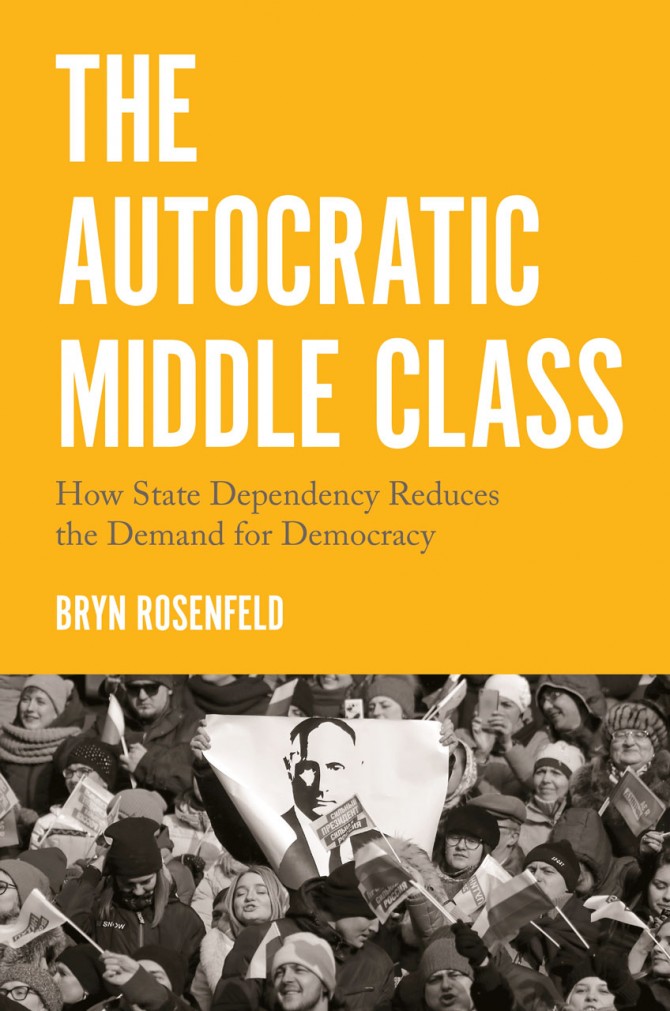Prosperity strengthens the middle class, and a strong middle class paves the way for democracy: This progressions has been the conventional wisdom, from Aristotle to contemporary political science scholarship.
The idea also appears frequently in popular accounts of China and Russia, two countries with rapidly expanding middle classes, according to Bryn Rosenfeld, assistant professor of government in the College of Arts and Sciences.
Yet in observing Russia and other post-Soviet countries, Rosenfeld notes authoritarianism - not democracy - is deepening in these countries despite impressive economic growth and a growing middle class.
Rosenfeld's new book, "The Autocratic Middle Class: How State Dependency Reduces the Demand for Democracy," published Dec. 1, takes a wide view of developments in the ex-communist countries over the post-Soviet period, to challenge a basic tenet of democratization theory.
"This book argues that a middle class whose status depends on public employment for an authoritarian state is often antithetical to democracy," Rosenfeld wrote. "Drawing lessons from the post-communist countries, it sheds light on how the economic institutions of state employment benefit autocrats, helping them to secure the support of key middle-class constituencies."
Rosenfeld said that her own observation of the gap between standard political science accounts of the democratizing middle class and the reality in Russia inspired this line of research.
"In Eastern Europe and the former Soviet Union, the collapse of communism inaugurated a period of market reforms, promising social transformation, prosperity, and democracy," Rosenfeld wrote. "The growth of a new, market-based middle class was widely expected to buttress these twin economic and political transitions."
But 30 years after the collapse of communism, large parts of the middle class remain heavily reliant on the state. "In Russia, for example," she wrote, "many people who were liberals in the 1990s are now state-employed and supporters of Putinism, or otherwise reluctant to oppose the regime."
Rosenfeld spent more than a year doing research in Russia, Ukraine and Kazakhstan for this project, conducting interviews, working with survey researchers and gathering archival data. She also drew on public opinion surveys from across the region and used a novel method to analyze surveys of protesters.
Market reforms failed to replace the old state-dependent middle classes of the communist era, "leaving the state as an influential patron of the region's educated, professional classes," she wrote.
Rosenfeld argues that when governments pursue top-down strategies of economic modernization, the middle class overwhelmingly owes its upward mobility to the state and is left dependent on the regime for prosperity. This middle class, she said, is hesitant to embrace democracy, and benefits from autocratic stability. Rather than demand political reform and the protection of individual rights, the autocratic middle class seeks to protect its own position and privileges, she said.
While the book focuses on post-communist autocracies, its arguments also have implications for understanding the erosion of democracy. Rosenfeld points out that democratic reversals are often accompanied by politicization of the public sector, a concern in leading democracies, including the United States.
For example, she cited the Trump administration for criticizing laws like the Hatch Act that prohibit federal government employees from participating in political activities while they are working in an official capacity.
"These laws separate the U.S. from countries like those I study where autocrats routinely use government employees as an extension of their campaign staff and government offices as satellites of their campaign headquarters," Rosenfeld said.
The book also has implications for Russia's response to the pandemic, Rosenfeld said.
"The Kremlin is trying hard, even as the economy deteriorates, to keep the support of Russia's state-employed middle class," she said. "With parliamentary elections next year, whether they stay on board will be a key determinate of the future of Putinism."
Kate Blackwood is a writer for the College of Arts and Sciences.







